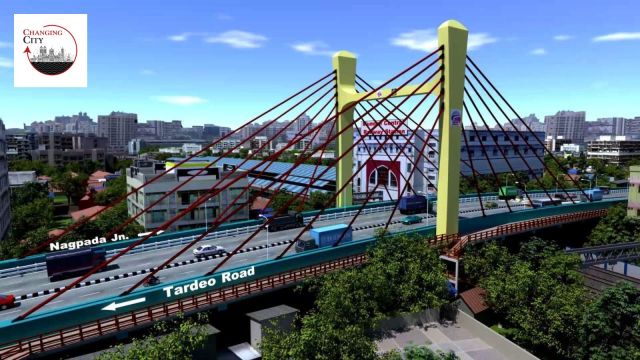Changing City: A twin cable-stayed bridge at Mumbai’s Dadar to begin operations next year
The new cable-stayed bridge will replace the British-era Tilak Bridge, which was declared dilapidated in 2019.
 The twin bridges are being constructed in two phases, with each part having a width of 16.7 metres. (File photo)
The twin bridges are being constructed in two phases, with each part having a width of 16.7 metres. (File photo)The construction of a twin cable-stayed bridge at Mumbai’s Dadar is progressing fast to replace the 100-year-old Tilak Bridge, which is a primary east-west connector, according to the Brihanmumbai Municipal Corporation (BMC).
Background of the project:
The British-era Tilak Bridge, built in 1925, was declared dilapidated in a structural audit that was carried out in 2019, following which the Brihanmumbai Municipal Corporation (BMC) had proposed the construction of a new bridge. The new bridge will be a cable-stayed structure that is being built parallel to the old Tilak Bridge, which will remain intact till the new bridge is built to ensure traffic movement is not affected. It is only after the new bridge is opened that the old structure will be pulled down by the authorities.
Specifications of the project:
The new bridge will be 600 metres long and will comprise six vehicular lanes. The twin bridges are being constructed in two phases, with each part having a width of 16.7 metres. The new superstructure will be wider when compared with the old structure and will allow a larger number of vehicles to pass at any given time.
Current status and deadline:
The bridge is being constructed in two phases. The first phase is expected to be completed by April 2026. This phase will include three vehicular lanes and will cater to both east-west traffic. Once this portion is ready, the old bridge will be pulled down in a systematic manner, and the second phase will be built in over 18 more months. The overall structure, comprising six vehicular lanes, will be ready by 2028. As of today, all the foundation work of the bridge has been completed, while the girder launching and superstructure work are in progress.
Cost:
The bridge is being constructed by BMC and Maharashtra Rail Infrastructure Development Corporation (MRIDC). The total cost of this project has been pegged at Rs 375 crore.
Administration speaks:
“The construction of the new bridge is being planned and executed strategically so that the existing traffic movement is not disrupted. Once the bridge becomes operational, it will improve traffic movement and will also enhance the appeal of this place. During Ganeshotsav, this bridge is also frequented by devotees and pedestrians, and considering the poor health of this bridge, we issue safety guidelines every year; therefore, a new bridge is of utmost requirement,” said Abhijit Bangar, additional municipal commissioner (Projects).







